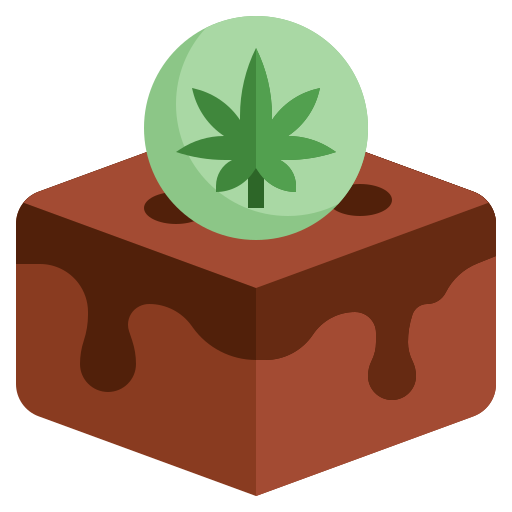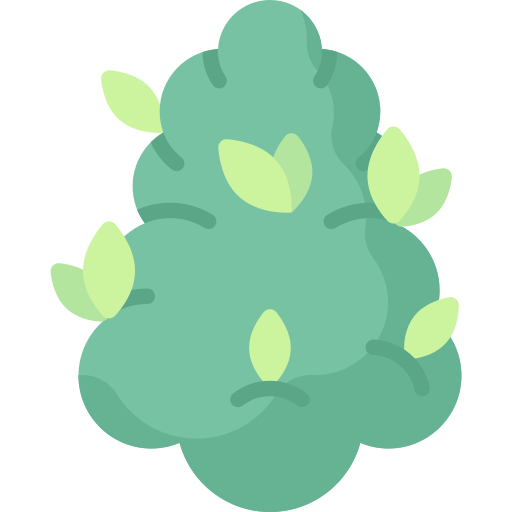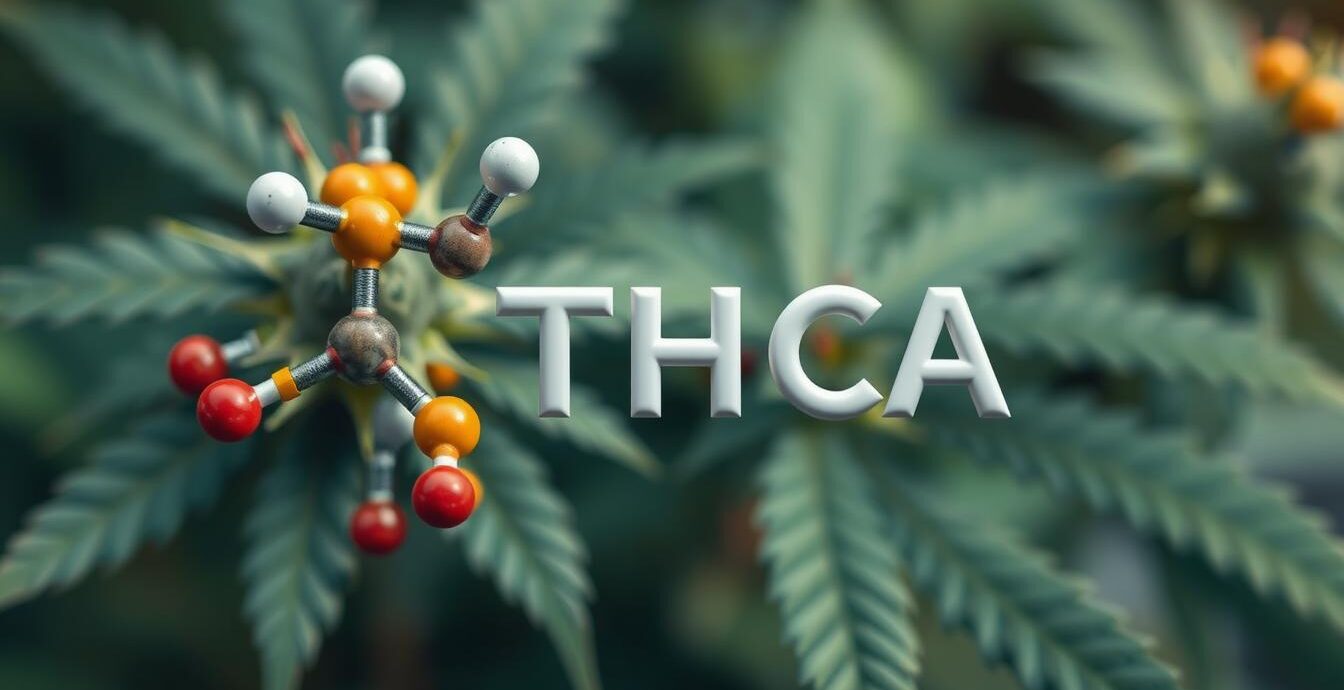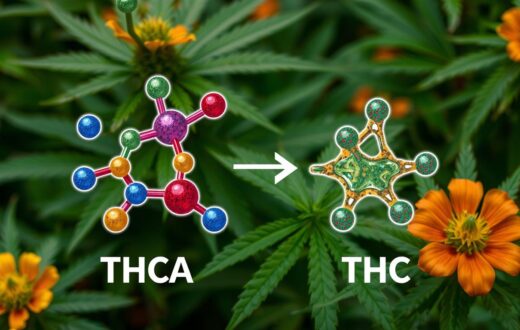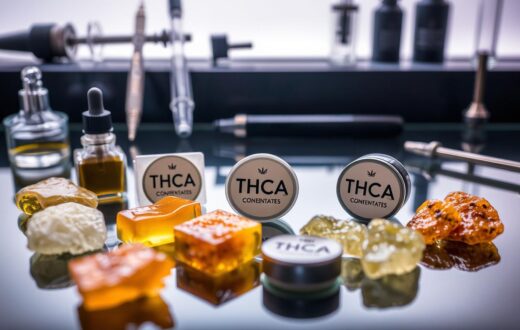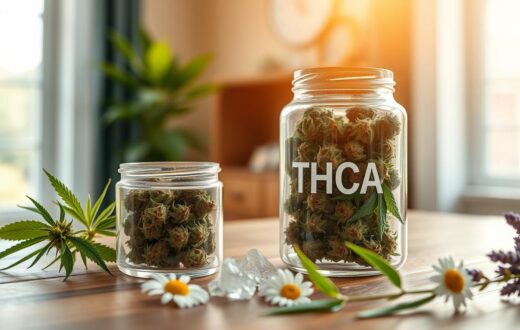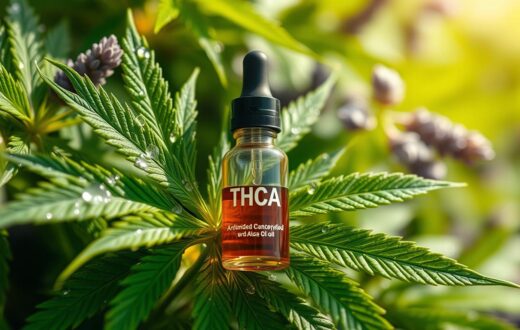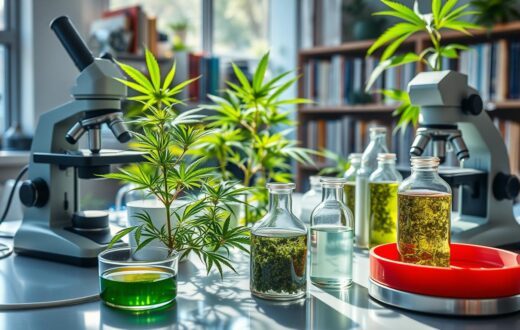Ever wondered about the hidden powerhouse in raw cannabis that doesn’t get you high? Meet THCA, the unsung hero of the cannabis world. This fascinating compound is turning heads in the scientific community, but what makes it so special?
THCA, short for tetrahydrocannabinolic acid, is a key player in the cannabis plant’s chemical makeup. As the precursor to THC, THCA offers a unique set of potential benefits without the psychoactive effects. Let’s dive into the world of this intriguing cannabinoid and uncover why it’s catching the attention of researchers and wellness enthusiasts alike.
In this guide, we’ll explore the THCA definition, its role in the cannabis plant, and how it differs from its famous cousin, THC. We’ll also look at the potential therapeutic properties of this non-intoxicating compound and why it’s becoming a hot topic in cannabis research.
Ready to unlock the secrets of THCA? Let’s embark on this journey to understand one of nature’s most fascinating molecules and its place in the ever-evolving cannabis landscape.
What is THCA and How Does it Work
THCA, short for tetrahydrocannabinolic acid, is a key part of cannabis plants. It’s important for the plant’s growth and has special properties. These set it apart from THC, its well-known cousin. Let’s explore how THCA affects our bodies.
Understanding Tetrahydrocannabinolic Acid
THCA is a cannabinoid found in hemp and cannabis. It forms when the plant breaks down CBGA. Unlike THC, THCA doesn’t make you feel high because it doesn’t bind to the same brain receptors.
The Role of THCA in Cannabis Plants
In cannabis plants, THCA is found in fresh buds. As the plant dries, some THCA turns into THC. This is why fresh cannabis has different effects than dried cannabis. THCA helps protect the plant and may aid in its growth.
Chemical Structure and Properties
THCA looks similar to THC but has a key difference. It has an extra part called a carboxylic acid group. This small change makes THCA act differently in our bodies. Knowing about THCA helps us understand its unique effects and benefits.
The Science Behind THCA to THC Conversion
Ever wondered how cannabis becomes psychoactive? The magic happens through a process called thca to thc conversion. Let’s dive into the science behind this fascinating transformation.
Decarboxylation Process Explained
Decarboxylation is the key to thca to thc conversion. This process removes a carboxyl group from THCA, turning it into THC. It’s like flipping a switch that activates the compound’s mind-altering effects.
Heat and Time Effects on Conversion
Heat plays a crucial role in thca to thc conversion. When you smoke or vape cannabis, the high temperatures trigger rapid decarboxylation. Baking edibles also causes this change, though more slowly. Time can lead to conversion too, as THCA gradually turns to THC when cannabis is stored.
Natural vs. Artificial Conversion Methods
Nature has its way of converting THCA to THC. Sunlight and aging can cause this transformation over time. But we’ve found faster methods. Smoking, vaping, and cooking cannabis speed up the process. Each method affects the rate and efficiency of thca to thc conversion differently.
Understanding this conversion is key for both recreational and medical cannabis users. It helps explain why raw cannabis won’t get you high, but processed products will. This knowledge can guide how you choose and use cannabis products for your needs.
THCA vs THC: Key Differences
When we look at THCA vs THC, it’s important to know their unique traits. THCA is found in raw cannabis and doesn’t cause a high. THC, however, is known for its mind-altering effects. This difference comes from their molecular structures and how they interact with our bodies.
THCA is a powerhouse in the therapeutic field. It has strong anti-inflammatory and neuroprotective properties, possibly better than THC. Both can help with nausea, but THCA might be more effective at lower doses. This makes THCA a good choice for those looking for relief without the high.
These cannabinoids interact with our bodies in different ways. THC binds strongly to CB1 receptors in the brain, causing its psychoactive effects. THCA, however, doesn’t bind as much to these receptors. This is why THCA doesn’t produce a high, even though it’s THC’s precursor.
Knowing the differences between THCA vs THC is crucial for anyone using cannabis. Each offers unique benefits and effects, meeting different needs and preferences in cannabis use.
Benefits and Therapeutic Properties of THCA
THCA has many potential health benefits that interest researchers and cannabis fans. This compound, found in raw cannabis, shows promise in various therapeutic areas.
Anti-inflammatory Properties
One key benefit of THCA is its anti-inflammatory potential. Studies show it may reduce body inflammation. This could help manage conditions like arthritis or inflammatory bowel diseases.
Neuroprotective Effects
THCA might also protect our brain cells. Research suggests it could shield neurons from damage. This could slow the progression of neurodegenerative diseases. This neuroprotective quality is an exciting area of study.
Pain Management Potential
Another promising aspect of THCA is pain relief. Some users say THCA helps manage chronic pain without the psychoactive effects of THC. While more research is needed, this is encouraging for those looking for natural alternatives.
It’s important to remember that while these benefits are promising, most studies have been on animals. Human trials are needed to fully understand and confirm THCA’s therapeutic properties. As research continues, we may find even more ways this compound can help with health and wellness.
THCA Products and Consumption Methods
THCA products are available in many forms, meeting various needs and preferences. Raw cannabis flower is a favorite for those wanting THCA’s benefits without the high. Some add fresh cannabis leaves to smoothies or juices for its potential health benefits.
THCA diamonds are gaining popularity for their concentrated form. These crystals are used to increase THC levels in marijuana. THCA patches provide a steady dose through the skin, offering a controlled experience.
Edibles like THCA gummies are becoming a tasty option for those who prefer not to smoke or vape. These products let users enjoy THCA’s benefits in a more enjoyable way. As the market grows, we can expect to see even more creative THCA products.
Understanding THCA Potency and Testing
THCA potency is key in cannabis products. It changes a lot between plants and products. Accurate testing is vital. Let’s look at how experts measure THCA levels and what you should know about labels.
Laboratory Testing Methods
Labs use advanced methods to find THCA levels. Techniques like high-performance liquid chromatography and gas chromatography are used. They break down and analyze cannabis compounds. But, THCA can turn into THC during storage, which can skew results.
Interpreting THCA Content Labels
Reading labels can be hard. A study found many hemp samples had more THCA than allowed. It’s crucial to understand what you’re buying. Look for total THCA content on labels. But, remember, this number might not always be exact because THCA is unstable.
When shopping, remember that THCA potency can change. Products stored wrong might have different levels than the label says. Always buy from trusted sources with up-to-date lab results. This way, you can make better choices about your cannabis use.
Legal Status and Regulations of THCA
THCA legality is complex in the United States. As cannabis laws change, knowing the rules about THCA is key for everyone.
Federal Laws and Guidelines
At the federal level, THCA is okay in hemp with less than 0.3% THC. This rule comes from the 2018 Farm Bill, which made growing hemp legal. But, there’s a catch. THCA can turn into THC, a controlled substance.
State-specific Regulations
State laws on THCA vary a lot. Some states allow THCA products, while others have strict rules. For example, places where marijuana is legal might let THCA products. But, places with strict laws might not.
THCA’s legal status is unclear, causing problems for users and businesses. In places where marijuana is banned, THCA might be in a gray area. This is because THCA can turn into THC, which is illegal.
It’s important for people to check local laws before using THCA products. The rules on THCA and cannabis are always changing. So, staying up-to-date is crucial.
THCA Extraction and Production Methods
THCA extraction is key in the cannabis world. It’s found in both marijuana and hemp. Skilled workers use advanced methods to get THCA from legal hemp, making it easier for people to buy.
The extraction needs to be precise to avoid losing THCA’s special qualities. This is crucial. Different methods are used, each with its own ups and downs.
THCA diamonds are a big hit in the market. They’re made by carefully extracting THCA from cannabis. This process uses specific heat and pressure. It results in pure THCA crystals that fans love.
The cannabis world is always changing, and so are THCA extraction methods. People are working hard to make these methods better. They want to keep THCA’s quality high. The future of THCA looks bright, with new ideas coming up.
Safety Considerations and Side Effects
THCA might have benefits, but knowing its safety is key. Side effects from THCA are usually mild, unlike THC. Here’s what you need to know to use THCA safely.
Common Side Effects
Side effects of THCA include stomach issues, nausea, and skin problems. Some people might feel respiratory issues when using THCA products. Start with small doses and watch how your body reacts.
Risk Factors and Precautions
Some people might face more side effects from THCA. Pregnant women, those with liver issues, and mental health history should talk to a doctor first. If THCA turns into THC, it could cause feelings of euphoria, altered perception, or anxiety.
Drug Interactions
THCA can affect how your body handles medications. This might lead to unexpected side effects. Always tell your doctor if you’re using THCA, especially with prescription drugs. This step is crucial for your safety.
THCA in Medical Applications
THCA is getting more attention in the medical world. Scientists are looking into its benefits for health issues. They see it as a possible treatment for epilepsy, thanks to its ability to stop seizures like CBD does.
Researchers are also looking into THCA for Alzheimer’s disease. It might help slow down brain decline and improve thinking. Its ability to reduce inflammation is also being studied for other diseases. This suggests THCA could be used in many medical areas.
But, we need more research. Clinical trials are key to understanding THCA’s full potential. They will help figure out the right doses and any side effects. As studies continue, THCA might become a key part of medical treatments.
Comparing THCA with Other Cannabinoids
Cannabis plants have many compounds with special properties. Let’s see how THCA compares to other popular cannabinoids.
THCA vs Delta-8
THCA doesn’t make you feel high, but Delta-8 might slightly. Delta-8 is made through a chemical process. But, THCA is found naturally in raw cannabis.
THCA vs Delta-9
Delta-9 THC is known for making you feel high. THCA turns into Delta-9 THC when heated. But, THCA doesn’t make you feel high in its raw form.
THCA vs CBD
THCA and CBD are both non-psychoactive cannabinoids. They have some health benefits in common. But, their effects can be different. CBD is more studied and used in many wellness products.
Looking at THCA vs other cannabinoids, each has its own special traits. THCA is known for its health benefits without causing a high. Knowing these differences helps people pick the right products for them.
Storage and Preservation of THCA Products
Keeping THCA products in good shape is key. THCA, the non-psychoactive part of THC, can change when exposed to certain things. Knowing how to store THCA products right is crucial.
Protecting THCA from heat, light, and oxygen is vital. These can start the process that turns THCA into THC. Store your THCA in a cool, dark spot. A fridge is great because it keeps the temperature low.
Use containers that don’t let air in to store THCA. Glass jars with tight lids are perfect. If you have many products, label them with the date you bought them. This helps you remember how long they’ve been stored.
Even with the best storage, some THCA will turn into THC over time. This change can affect the product’s legal status and how it works. People who use THCA regularly should watch for these changes and adjust their use as needed.
Quality Control and Product Selection
Choosing the best THCA products requires careful attention. Smart shoppers look for thca product quality to ensure safety and effectiveness. It’s important to find reputable manufacturers who are transparent.
Seek out companies that share third-party lab testing results. These tests check the THCA content and look for contaminants. This is a key step to avoid mislabeled or adulterated products.
The method used to extract THCA affects the product’s quality. Some methods keep more beneficial compounds than others. It’s good to research different extraction processes to know what you’re getting.
The source of the cannabis or hemp is also crucial. Plants grown in clean soil without harmful pesticides make better THCA products.
Be cautious of unregulated THCA products. They might have unknown substances or wrong THCA levels. Choose brands that follow industry standards and maintain consistent quality. Your health and safety depend on making smart choices when picking THCA products.
Future Research and Developments in THCA Studies
THCA research is really taking off. Scientists are exploring its potential benefits. They’re looking into its effects on brain health, inflammation, and pain relief.
Labs are trying to understand how THCA interacts with our bodies. They aim to unlock its secrets. This could lead to new treatments for many conditions.
Researchers are also working on keeping THCA stable in products. They’re experimenting with new extraction methods. These efforts could result in better THCA products for us.
As research advances, THCA might become more important in medicine. It could help with chronic pain or brain protection. The future of THCA looks very promising!

